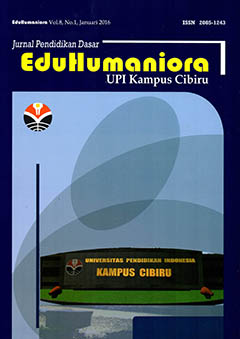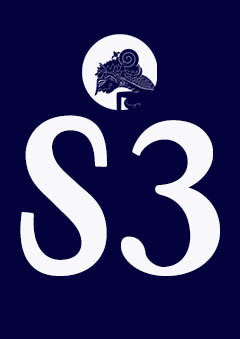Environmental Education Based on Tengger’s Local Wisdom in Growing Conservation Character in Elementary School
Abstract
Environmental education is expected to be able to foster the character of students who are more appreciative of various existing nature and strive to preserve them. The problem in this paper is how the local wisdom-based environmental education model through the reconstruction of original science is capable of deepening science concepts and fostering a conservation character, as well as how the application examples of local wisdom-based environmental education models through the reconstruction of original science are capable of deepening scientific concepts and fostering character. The local wisdom-based environmental education can be carried out by reconstructing indigenous science into scientific science. The application of the local wisdom-based environmental education model is by observing a culture that exists in society to reconstruct further its scientific concepts, which in the end, can foster the value of the conservation character of students.
Full Text:
PDFReferences
Aikens, K., & McKenzie, M. (2021). A comparative analysis of environment and sustainability in policy across subnational education systems. Journal of Environmental Education, 52(2), 69–82. https://doi.org/10.1080/00958964.2021.1887685
Alcántara-Rubio, L., Valderrama-Hernández, R., Solís-Espallargas, C., & Ruiz-Morales, J. (2022). The implementation of the SDGs in universities: a systematic review. Environmental Education Research, 28(11), 1585–1615. https://doi.org/10.1080/13504622.2022.2063798
Arora, S., Mate, K. S., Jones, J. L., Sevin, C. B., Clewett, E., Langley, G., Brakey, H. R., Reims, K., Troyer, J. L., Grebe, J. M., Davis, H. T., Wolfe, V. K., Chaufournier, R., & Baker, N. (2020). Enhancing Collaborative Learning for Quality Improvement: Evidence from the Improving Clinical Flow Project, a Breakthrough Series Collaborative with Project ECHO. The Joint Commission Journal on Quality and Patient Safety, 46(8), 448–456. https://doi.org/https://doi.org/10.1016/j.jcjq.2020.04.013
Astriyantika, M., Arief, H., & Sunarminto, T. (2014). Studi Konservasi Sumberdaya Alam Hayati Pada Masyarakat Tengger di Resort Ranu Pani, Taman Nasional Bromo Tengger Semeru. Media Konservasi, 19(1). https://doi.org/10.29244/medkon.19.1.%25p
Baum, F., MacDougall, C., & Smith, D. (2006). Participatory action research. Journal of Epidemiology and Community Health, 60(10), 854. https://doi.org/https://doi.org/10.1136%2Fjech.2004.028662
Børresen, S. T., Ulimboka, R., Nyahongo, J., Ranke, P. S., Skjaervø, G. R., & Røskaft, E. (2023). The role of education in biodiversity conservation: Can knowledge and understanding alter locals’ views and attitudes towards ecosystem services? Environmental Education Research, 29(1), 148–163. https://doi.org/10.1080/13504622.2022.2117796
Briggs, L., Krasny, M., & Stedman, R. C. (2019). Exploring youth development through an environmental education program for rural indigenous women. Journal of Environmental Education, 50(1), 37–51. https://doi.org/10.1080/00958964.2018.1502137
Dewey, J. (1934). The supreme intellectual obligation. Science Education, 18(1), 1–4. https://doi.org/https://doi.org/10.1002/sce.3730180102
Dewi, C. A., Erna, M., Martini, Haris, I., & Kundera, I. N. (2021). Effect of Contextual Collaborative Learning Based Ethnoscience to Increase Student’s Scientific Literacy Ability. Journal of Turkish Science Education, 18(3). https://doi.org/10.36681/tused.2021.88
Druker-Ibáñez, S., & Cáceres-Jensen, L. (2022). Integration of indigenous and local knowledge into sustainability education: a systematic literature review. Environmental Education Research, 28(8), 1209–1236. https://doi.org/10.1080/13504622.2022.2083081
Durkheim, E. (1972). Emile Durkheim: selected writings. Cambridge University Press.
Fauzani, P., & Aminatun, T. (2021). Adiwiyata Program Implementation in Inculcating Environmental Care Characters: A Literature Review BT - Proceedings of the 6th International Seminar on Science Education (ISSE 2020). 150–154. https://doi.org/10.2991/assehr.k.210326.021
Handayani, D. (2019). Use of Animal Metaphors in Javanese Language within Tengger Society BT - Proceedings of the Fifth Prasasti International Seminar on Linguistics (PRASASTI 2019). 131–134. https://doi.org/10.2991/prasasti-19.2019.20
Hariyati, Y., Soeparjono, S., & Winarto, P. S. (2020). Preception of Tengger Society on the Benefits of Etnobotani as Herbal Medicines. https://doi.org/10.18343/jipi.25.3.440
Husamah, H., Suwono, H., Nur, H., & Dharmawan, A. (2022). Action competencies for sustainability and its implications to environmental education for prospective science teachers: A systematic literature review. EURASIA Journal of Mathematics, Science and Technology Education, 18(8), em2138. https://doi.org/10.29333/ejmste/12235
Jati, B., Serafinah, I., & Bagyo, Y. (2018). Survey and utilization of wild plants (extractivism) in Tengger society east Java, Indonesia. International Journal of Modern Botany, 8(1), 8–14. https://doi.org/10.5923/j.ijmb.20180801.02
Jones, V., & Podpadec, T. (2023). Young people, climate change and fast fashion futures. Environmental Education Research, 1–17. https://doi.org/10.1080/13504622.2023.2181269
Julien, C., Castelli, D., Bray, D., Lee, S., Burson, S., & Jung, Y. (2021). Project SMART: A cooperative educational game to increase physical activity in elementary schools. Smart Health, 19, 100163. https://doi.org/https://doi.org/10.1016/j.smhl.2020.100163
Koirala, K. P. (2022). Ethno science practice as Indigenous wisdom: challenges to braiding with Western-based school science curriculum. Diaspora, Indigenous, and Minority Education, 1–13. https://doi.org/10.1080/15595692.2022.2138321
Kopnina, H. (2020). Education for the future? Critical evaluation of education for sustainable development goals. Journal of Environmental Education, 51(4), 280–291. https://doi.org/10.1080/00958964.2019.1710444
Lickona, Thomas. (2022). Character matters (Persoalan karakter): Bagaimana membantu anak mengembangkan penilaian yang baik, integritas, dan kebajikan penting lainnya. Bumi Aksara.
Lickona, Tom, Schaps, E., & Lewis, C. (2007). CEP ’ s Eleven Principles of Effective Character Education. In Character Education Partnership. Character Education Partnership.
Lowe, C. (2013). Wild profusion: biodiversity conservation in an Indonesian archipelago. Princeton University Press. https://doi.org/10.1515/9781400849703
Malandrakis, G., Papadopoulou, P., Gavrilakis, C., & Mogias, A. (2019). An education for sustainable development self-efficacy scale for primary pre-service teachers: construction and validation. Journal of Environmental Education, 50(1), 23–36. https://doi.org/10.1080/00958964.2018.1492366
Marzuki, A., Mohamad, M. Z., & Baru, R. (2018). Role of Majelis Taklim and Adaptation Muslim Minority with Tengger Local Culture. International Journal of Academic Research in Business and Social Sciences, 8(10), 245–253. http://dx.doi.org/10.6007/IJARBSS/v8-i10/4730
McClaren, M. (2019). Revisioning environmental literacy in the context of a global information and communications ecosphere. Journal of Environmental Education, 50(4–6), 416–435. https://doi.org/10.1080/00958964.2019.1687408
Okebukola, P. A. (1986). The influence of preferred learning styles on cooperative learning in science. Science Education, 70(5), 509–517.
Patton, M. Q. (2014). Qualitative research & evaluation methods: Integrating theory and practice. Sage publications.
Sadia, W. (2013). Model Pendidikan Karakter Terintegrasi Pembelajaran Sains. JPI (Jurnal Pendidikan Indonesia), 2(2), 209–220. https://doi.org/10.23887/jpi-undiksha.v2i2.2165
Subianto, J. (2013). Peran Keluarga, Sekolah, dan Masyarakat dalam Pembentukan Karakter Berkualitas. Edukasia : Jurnal Penelitian Pendidikan Islam, 8(2). https://doi.org/10.21043/edukasia.v8i2.757
Suryanti, S., Mariana, N., Yermiandhoko, Y., & Widodo, W. (2020). Local wisdom-based teaching material for enhancing primary students’ scientific literacy skill. Jurnal Prima Edukasia, 8(1), 96–105. https://doi.org/10.21831/jpe.v8i1.32898
Utomo, M. R., Hidayat, K., & Yuliati, Y. (2015). The Meaning of Agriculture and Tourism Activities for Tengger Society in Wonokitri Village, Tosari District, Pasuruan of Regency. Habitat, 26(1), 40–46. https://doi.org/https://doi.org/10.21776/ub.habitat.2015.026.1.5
Von Rintelen, K., Arida, E., & Häuser, C. (2017). A review of biodiversity-related issues and challenges in megadiverse Indonesia and other Southeast Asian countries. Research Ideas and Outcomes, 3, e20860. https://doi.org/10.3897/rio.3.e20860
Widodo, W., Sudibyo, E., Suryanti, S., Sari, D. A. P., Inzanah, I., & Setiawan, B. (2020). The Effectiveness of Gadget-Based Interactive Multimedia in Improving Generation Z’s Scientific Literacy. Jurnal Pendidikan IPA Indonesia, 9(2), 248–256.
Wood, L. M., Sebar, B., & Vecchio, N. (2020). Application of rigour and credibility in qualitative document analysis: Lessons learnt from a case study. The Qualitative Report, 25(2), 456–470. https://doi.org/10.46743/2160-3715/2020.4240
Yuliana, Sriyati, S., & Sanjaya, Y. (2017). Local wisdom of Ngata Toro community in utilizing forest resources as a learning source of biology. AIP Conference Proceedings, 1868(1), 100007.
DOI: https://doi.org/10.17509/eh.v17i2.83210
Refbacks
- There are currently no refbacks.
Copyright (c) 2025 EduHumaniora | Jurnal Pendidikan Dasar Kampus Cibiru
EduHumaniora: Jurnal Pendidikan Dasar
Published in collaboration Program Studi PGSD UPI Kampus Cibiru
and
HDPGSDI
This work is licensed under a Creative Commons Attribution-ShareAlike 4.0 International License.















